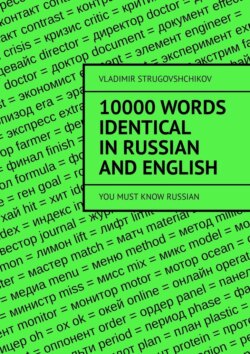Читать книгу 10 000 words identical in Russian and English. You must know Russian - Vladimir Strugovshchikov - Страница 3
RULES FOR SIMILAR WORDS
Оглавление1) Words are completely identical in spelling in both languages. For example Sport – спорт.
2) Without -а/-я. – There are about 5000 words that are translated into English, if you just remove the ending -а / -я in Russian. For example comedy – комедия.
3) А → S. – Instead of the Russian final letter «a» in English, «s» is pronounced. These are words denoting any kind of activity, a field of science or a set of tools (objects) for a similar purpose. For example physics – физика.
4) А →/ эй / – Words are similar in spelling, but differ in pronunciation. For example Date [дэйт] – дата.
5) «-ЦИЯ» (англ. -tion) → «шн». – There are up to 30,000 such words. Instead of the Russian final «tsiya», we pronounce «shn» in English. And most often in them the Russian «a» before the «tsiya» is pronounced like «ay». For example Integration [интигрэ'йшн] – интеграция.
6) «-СИЯ» (англ. -sion) → «шн» – such words up to 20,000. Instead of Russian, «sia» is pronounced «shn» in English. For example Profession [прэфэ'шн] – профессия
7) «-ГИЯ» → «джи» – such words up to 10,000. Instead of the Russian final "-gi» in English we pronounce «ji». For example Methodology [мэсэдо'лэджи] – методология
8) Г→H – there are several hundred such words. In some words, instead of the Russian «g» in English, we pronounce «h». For example Hematoma [химэ'тоума] – гематома
9) Ц→ С – there are several hundred such words. In such words, instead of the Russian «ts» in English, we pronounce «s», moreover, in English there is no sound at all [ts]. For example Pesticide [пэ'стисайд] – пестицид
10) И→АЙ – there are several hundred such words. In such words, instead of the Russian «i» in English, we pronounce «ay». For example Client [кла'йэнт] – клиент
11) Without «-НЫЙ» – there are several thousand such words. Such words in Russian with the final "-ny, -naya, -noe, -nye» can be translated into English by simply removing them. For example Effective [ифэ'ктив] – эффективный
12) «-ЧНЫЙ»/«-СКИЙ» → «-к» – Thousands of words in Russian with the endings "-chny, -chny, -chnoye, -nye» or "-ski, -skaya, -ske, -skie» are translated into English by dropping the ending "-nyy» (or "-skiy») and replacing «сh» (or «che») with «k»: it was: "– (ch) nyy» / "– (che) skiy» → it became just "-k». For example Epic [э'пик] – эпический
There are still many similar rules, for example, prefixes are added in some words, negation is added in some, various endings are added in some, etc.
